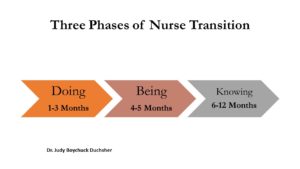By Rose O. Sherman, EdD, RN, NEA-BC, FAAN
A new trend has begun to happen in health systems across the country. New graduates are leaving their employers right after they complete six months of their residency program. While historically, travel agencies and other health systems might not have employed nurses with so little experience – the recent turmoil with the nursing workforce has changed all of that. Trends like this have a butterfly effect which includes the following:
- Many new nurses are breaking contracts with health systems to take jobs where they will make more money without any appreciation of the investment that has been made in their transition.
- It becomes increasingly more difficult to achieve a return on investment for residency programs and intense specialty training.
- As new nurses leave, they are replaced by new graduates leading to an endless cycle of inexperienced nurses serving as preceptors and charge nurses when they are not ready to assume these roles.
- The new nurse is never fully socialized into a team and the profession.
While all of these trends have a significant immediate impact, the last two trends have profound implications for the professional socialization of the future workforce. Canadian researcher, Judy Boychuck Duchsher has spent her career building on the work of Marlene Kramers’s reality shock research. Duchsher describes three phases of nurse transition.
Doing Phase – the new nurse is on a steep learning curve and overwhelmed meeting practice expectations. The stress and anxiety level of the nurse is very high.
Being Phase – the nurse achieves rapid advancement in their thinking, knowledge level, and skills. Nurses begin to feel comfortable in their roles.
Knowing Phase – the nurse begins to see him or herself as a separate practitioner from others on the team. It is during this phase that nurses begin to find professional meaning and purpose in their work when they receive support. They can begin to provide others with team backup.
Duchsher warns us that it is in this final phase that new graduates often become restless and dissatisfied. The second six months of a beginning nurse’s career can be very destabilizing without coaching and mentoring from seasoned nurses. Nurses need consistent support and constructive feedback through all 12 months otherwise they may not achieve a desirable level of professional socialization. It is during this last phase that new nurses achieve self-actualization and are ready to become engaged in the shared governance of their units.
Sadly, many units today don’t have seasoned nurses to provide the coaching and mentoring that new nurses need. Nurses in the “being phase” are coaching nurses in the “doing phase.” New graduates are moving out of their first employer without achieving full professional socialization and involvement as team members. If the nurse’s next role is working for an agency or on a travel assignment, it is unlikely that they will fully integrate into a team and/or profession. This shift has long-term implications for the nursing profession if significant numbers of new graduates choose contingent employment as their career trajectory.
My thoughts are that we need to present this model to new graduates. We need to talk more about professional socialization early in the orientation cycle. New nurses need coaching to understand the need to play the long game when looking at their careers. It cannot be all about the money. This career coaching for new graduates would be something that many recently retired nurses would enjoy doing. Without intervention, this trend could have a significant impact on the future of nursing.
References
Duchscher, J.B & Windey, M. (2018). Stages of Transition and Transition Shock. Journal of Nursing Professional Development.
© emergingrnleader.com 2021
Our Most Popular Right Now – Become the Boss No One Wants to Leave Nurse Retention in Turbulent Times
Give your leadership team the gift of a highly rated webinar – Nursing Leadership in 2021: Rebooting after a Life-Quake A Nursing Leadership Reboot Workshop.
Read the Nurse Leader Coach – Available at Amazon and Other Book Sellers.
Recommended Book by the Association of Critical Care Nurses – The Nuts and Bolts of Nursing Leadership: Your Toolkit for Success





 LinkedIn
LinkedIn Instagram
Instagram